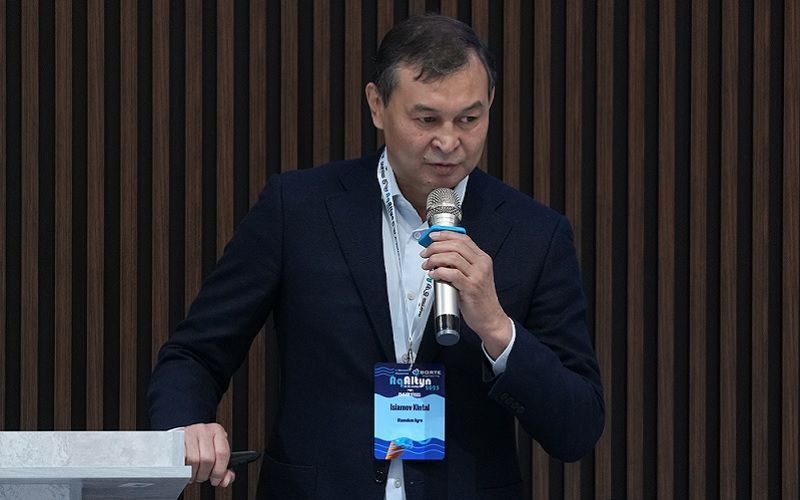Kintal Islamov: Kazakhstan's Industrial Farms Need a New Support Model

During his speech, Kintal Islamov shared his practical experience in building a large-scale industrial farm. Atameken-Agro JSC is one of the largest agricultural holdings in the country, with a land bank of about 300,000 hectares. Over three years, the company implemented a project to construct a high-tech dairy farm, reaching a herd size of 1,400 cows.
"We implemented everything possible. Some of it was even 'excessive.' Therefore, the project turned out to be quite expensive," noted the speaker. "When they say that government money only goes to large enterprises, it's not true. We requested only 25%. But even the subsidies that we are legally entitled to, we did not receive."
According to him, the state owes Atameken-Agro JSC 4.4 billion tenge: "These funds were included in the project model. Now they are hanging as debt - to us and to investors."
Kintal Islamov publicly questioned the reliability of milk production data: "The statistics are unclear. Production and processing do not match. What is reflected as milk fr om private households does not actually go into processing and likely is not consumed at all."

As the speaker explained, milk production in Kazakhstan decreased to 3.58 million tons in 2024, compared to 4.12 million tons in 2023, due to a drop in volumes from private household farms (PHFs). Meanwhile, processing remains at 1.39 million tons, but with enterprise utilization at 77%, the sector faces a chronic raw material shortage, especially in the eastern and northern regions.
In 2024, PHFs provided 2.18 million tons, but their productivity remains low - about 10 liters per cow per day, while industrial farms produce 20 liters, and enterprises up to 30 liters. According to Kintal Islamov, the scale effect in Kazakhstan is still unrealized: out of 3 million dairy cows, only 2 million are in PHFs, wh ere there is no quality control and supply stability.
Average dairy product consumption in the country has increased to 232 kg per person, placing Kazakhstan in the top 10 global consumers. However, imports remain high: in 2024, 818,000 tons were imported, equivalent to almost a quarter of domestic demand.


Although Kazakhstan officially faces a shortage of raw milk, Kintal Islamov noted: "We are already producing about 10 tons a day, then it will be 30, then 100. But there is no queue for our milk. And there is no struggle for volume." According to him, the actual behavior of processors does not confirm a severe shortage.
The expert shared that he initially planned to build a farm for 600 heads in two stages: "We decided that it was better to have one horror at once than two horrors gradually."
He emphasized that most of the old farm models in Kazakhstan no longer meet modern requirements:
"We studied the experience of many farms. Only 'Ais' is perhaps close to what it should be. But overall, the way most build, you can't build."
Kintal Islamov highlights four main systemic risks in the industry:
— low industrial production volumes;
— rising costs due to increased feed, fuel, and electricity prices;
— limited access to credit;
— competition from cheap imports from neighboring countries.
As presented in his presentation, building a farm for 3,000 milking cows in Kazakhstan requires about $34 million in investments, including the construction of the complex and the purchase of cows. These projects can bridge the gap between processing and current production volumes.
Kintal Islamov formulates the basic principle of successful dairy farms: Personnel – Feed – Climate.
— Personnel: lack of livestock specialists and veterinarians makes the staffing crisis one of the main growth limits.
— Feed: up to 65% of costs are formed by feed, and only own feed production allows stabilizing the economy.
— Climate: ventilation, microclimate, and stress reduction directly determine milk yield.

According to the expert, the weaknesses of the current system are:
— lack of a unified veterinary control model for PHFs;
— subsidy limits supporting small and outdated farms;
— lack of a 15–20 year strategy.
The industry needs:
— new types of subsidies;
— preferential financing;
— capital expenditure compensation;
— veterinary laboratories;
— digital ecosystem "e-APK."
General Partner and Key Engineering Partner - Borte Engineering
As a leading national producer of Kazakhstan, Borte Engineering creates high-tech equipment for the food industry, confirming its quality by being included in the Register of domestic producers. The company successfully cooperates with enterprises across Central Asia, strengthening the regional economy.
Innovation Partner - DeLaval
Altyn Sponsors - Alfa L Service, MB-System
Qola Sponsors - Tetra Pak, TOO Clever Machines
SPX FLOW APV | SEITAL SEPARATION
Partners - Dairy Union of Kazakhstan, Republican Chamber of Dairy and Combined Breeds of Cattle, Food Master










